Editor’s Note: Locally owned City Greens is opening it’s third restaurant today (June 28, 2016), and all proceeds on opening day go to Grow Dat Youth Farm. Renee Peck talked with co-founders Ben Kazenmaier and Abhi Bhansali in 2015, and their focus on quick, healthy food is continuing to help them grow.
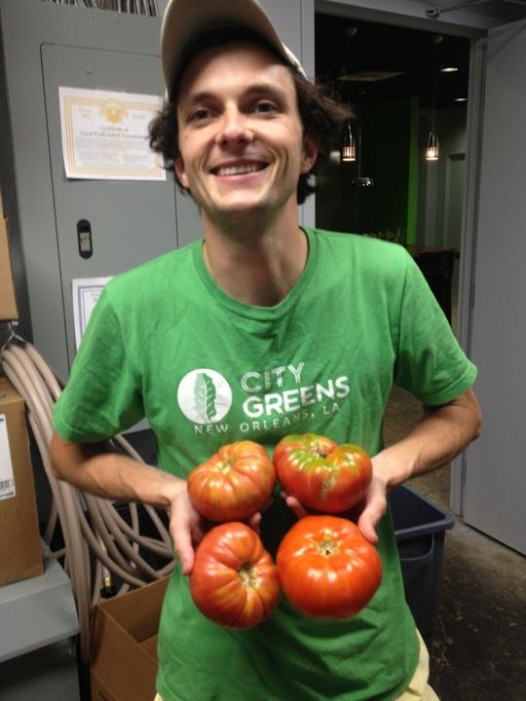
City Greens bounty (Photo: City Greens)
Hydroponic farmer. Microgreens king. Restaurateur. None of these were career tracks on Benjamin Kazenmaier’s radar as a student at Metairie Park Country Day school in New Orleans.
“I did not think I would be Farmer Ben,” he says with a laugh.
But just a decade later, after launching City Greens in 2012 with business partner Abhi Bhansali, Ben, 29, oversees a growing entrepreneurial empire of restaurants, farms and health food products that employs 60 equally young and optimistic New Orleanians (the oldest is 30).
Kazenmaier, who grew up in Germany and spent college time with Semester at Sea, always has been a well-traveled foodie. But he got the restaurant bug working as a bartender for local chef Kevin Vizard while in college. (After being batted about a bit post-Hurricane Katrina, he finished his degree at Tulane.)
“He taught me that there are two things that are important in the restaurant business,” Kazenmaier says. “Labor costs and food costs. And that nine out of 10 restaurants fail. The statistics were not appealing.”
But Kazenmaier, ever a numbers guy, started thinking about how to control at least one of those factors.
“I said, I can’t control the labor cost, but how can I control the food?” Kazenmaier explains. “I thought, why not produce my own food? I was dating a girl at the time in San Francisco, and I saw the salad movement there. I’d watch 300 people do lunch, and thought, this can work in New Orleans. I can really enhance this.”
The trick, he decided, lay in controlling the caliber and cost of the ingredients. So he scouted locations for a produce farm, considering the north shore but ultimately selecting Cottondale, Fla., for the purity of its aquifer. And then he built a 20,000 square-foot hydroponic farm to grow the leafy greens he’d need for his restaurant.
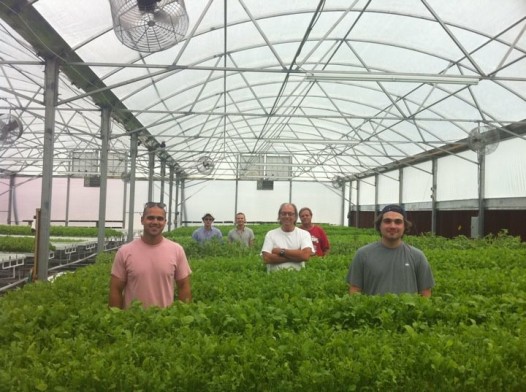
The team at City Greens farm (Photo: City Greens)
“Hydroponic farming is so much more efficient,” Kazenmaier says. “I had a vision of how I wanted to do this, and hired a consultant to help me through the process. Arugula takes 30 days to grow hydroponically, and you don’t want to wake up on day 29 and find that all the leaves are yellow. Hydroponics is one huge plumbing process.”
City Greens Farm was soon up and running, but the City Greens restaurant component of the concept, concurrently taking shape in the 909 Poydras building in New Orleans, was slowed by renovation delays.
“So I started cruising Highway 30A along the coast, stopping at all the high-end restaurants, testing the quality of our products. The chefs got really excited, and started asking me things like, hey, can you grow a purple radish sprout?”
That steered City Greens Farm into the microgreen market, a niche that it still occupies. The company supplies such esoteric items as miniature kohlrabi or clover to 300 restaurants across the Gulf South. The farm recently has been expanded to 60,000 square feet, with microgreens its primary output.
“Microgreens can average $160 a pound, more than expensive aged beef,” says Kazenmaier. “Most people consider them a garnish, but they are moving into the mainstream. And chefs are getting crazy – can you grow a micro wasabi?”
City Greens not only can fill such erudite requests, but also can grant exclusivity within a given region.
“Each contract is chef-specific. We set it up so that any chef can ask for anything. One wanted corn shoots. We had to grow them at night with LED lights.”
With trial and error, Kazenmaier learned the farming business: things like best storage temperatures (at 36 degrees, produce lasts three days longer than at 38 degrees) or how to deliver to miles of restaurants that all want their produce between 3 and 5 p.m. Nowadays, City Greens contracts with distributors to deliver product as far away as Atlanta, Birmingham and, soon, Chicago.
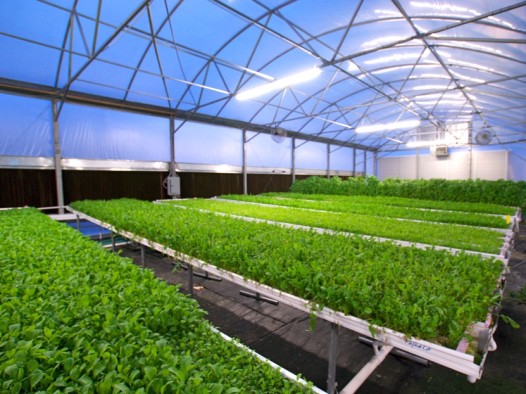
Everything is grown hydroponically at the farm. (Photo: City Greens)
But the core mission at the farm always was to supply City Greens restaurants, by bringing fresh produce to their tables within 72 hours of harvest. Sprinter vans arrive twice a week in New Orleans from the farm. Perhaps ironically, the restaurants can’t call their offerings organic, because they aren’t grown in soil, a USDA requirement for the term.
City Greens on Poydras serves as a busy lunch spot for the city’s downtown work force, with as many as 180 people an hour dining on wraps, soups and salads. Menus change seasonally, with dishes concocted around whatever produce is current. Though a chef spot-checks dish quality and fine-tunes the menu, this restaurant takes a collaborative approach.
“I’ve learned that we don’t need a star celebrity chef, but a good kitchen management structure. What we do is ingredient based; we use fresh ingredients and do very little to them.”
When it came time to expand to a second restaurant, Kazenmaier chose Jefferson Parish, with a location in Elmwood.
“Poydras is mainly a lunch spot, and caters to a very niche market. Elmwood is open seven days a week and with longer hours, and gave us the opportunity to test whether the concept could work nationwide. And it has been a real success there. It’s a totally different clientele, with different needs and wants. Who would have thought that cold-press kale juice would sell 5 to 1 at Elmwood over Poydras?”
Two new locations are underway, one on Metairie Road and the other on Veteran’s Highway. Menus are consistent across all locations. Proteins, soups and dressings are made at a central commissary, with chopping, slicing and dicing done onsite.
A year ago, City Greens added juicing to its lineup. Now the company produces a line of City Juice blends, created by a local consulting chef. With the current trend in healthier eating, demand is high.
“The Elmwood kitchen never closes. We have culinary talent in in the morning, prep work in the afternoon, and juicers at night. We’ve already outgrown our cold-press juicing machine.”
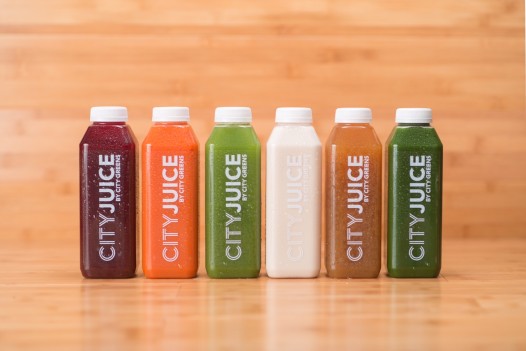
Juices were added to the City Greens product line a year ago. Photo: City Greens)
Expansion is in the genes of this intense young CEO, a self-confessed workaholic who sleeps about 3 hours in any 24. But City Greens is by no means a solo affair. Last week you could spot him washing dishes at the Poydras restaurant.
“I’m only as good as the team around me,” Kazenmaier says. “They know we’re in this together. We started with about 10 people, and it’s always been a very collaborative process. In the beginning, it was just, let’s get through the day. Everyone knows one another.”
City Greens employees use an app called Kudos to give community feedback and suggestions or ask questions. Kazenmaier has spotted talent in myriad ways – including one man with an “I need work” sign he hired from under the I-10 overpass. Company members, be says, embraced him.
The most recent City Greens expansion is a catering arm, with the film industry a steady customer. There’s a pilot program to partner with local schools on a hydroponic farming and nutrition education curriculum.
By the end of June, the first of half a dozen City Greens vending machines will be operating in the CBD.
“I thought, how can we grow without a brick and mortar location?” Kazenmaier explains. “So this will be a City Greens fresh grab and go station, with fresh salads on one side and juices on the other. We will fill it every morning, and give away whatever is left at the end of the day. Food will never be in there more than 24 hours.”
Eventually, says Kazenmaier, the credit-card operated, touch-screen hub will be able to fill online orders, much the way movie theaters sell advance tickets. And the City Greens kitchen can keep tabs on what has sold and restock machine slots with popular items throughout the day.
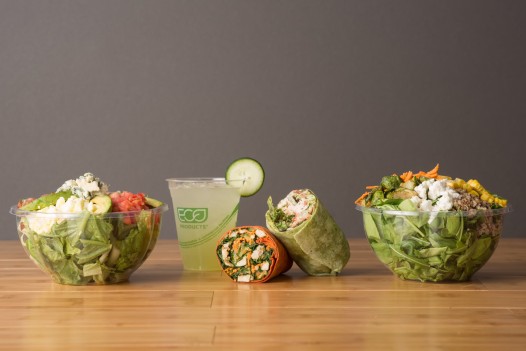
Produce at City Greens arrives within 72 hours of harvest. (Photo: City Greens)
Kazenmaier already dreams of the complex he wants to build on a lot he owns near Restaurant Depot. It would house a commissary kitchen, a research and development kitchen, dry storage, a juicing department and offices.
“My model is to create a central commissary kitchen that can feed all locations,” Kazenmaier says. “It’s not efficient to cook 600 pounds of chicken in a hydro-oven at Poydras Street. With a commissary kitchen, you get consistency.
“It would be an excellent point from which to reach all areas of the city. And space is something people underestimate. We have eco-friendly packaging we have to order in bulk, and just having some place to put all those boxes can be an issue.”
While the current trend toward healthier eating has helped spur his success, Kazenmaier finds that New Orleans offers particularly fertile ground for his kind of project.
“Our customers are amazing. In New Orleans, if people feel that something is a part of their city, and they like it, they support it. You get a customer to company relationship that is unprecedented. New Orleanians want us to succeed.”
Ultimately, that – not just the numbers – is what keeps Kazenmaier going.
“I love instant gratification,” he says with a smile. “When you can see how you can make someone happy with a good meal – how much you can make someone’s day – it’s the best thing in the world.”
 NOLAbeings Multimedia artist Claire Bangser created NOLAbeings as a portrait-based story project that marries...
NOLAbeings Multimedia artist Claire Bangser created NOLAbeings as a portrait-based story project that marries...  Voodoo in New Orleans: Reviving history: New Orleans fortune telling This article takes a deep dive into the history of Voodoo in New Orleans, its hybridization with Catholicism, and its present-day place in the city's culture. The author visits fortune-tellers in the French Quarter, using their guidance as a tool for introspection rather than a deterministic predictor of the future. Through her experiences in New Orleans, the author feels a mystical connection to both the past and the future.
Voodoo in New Orleans: Reviving history: New Orleans fortune telling This article takes a deep dive into the history of Voodoo in New Orleans, its hybridization with Catholicism, and its present-day place in the city's culture. The author visits fortune-tellers in the French Quarter, using their guidance as a tool for introspection rather than a deterministic predictor of the future. Through her experiences in New Orleans, the author feels a mystical connection to both the past and the future. 